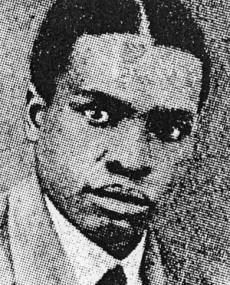
Mweli Skota was born in Kimberley in the 1880s and attended school there. He worked at various times as a clerk, journalist, court interpreter, and independent businessman. He was one of the founders of the ANC newspaper, Abantu-Batho, and served as its editor in the late 1920s. He failed at two other attempts to launch African newspapers.
Although associated at one time with the Bechuanaland and Griqualand African Congress, Skota was national and even pan-African in his outlook; it was he who in the late 1920s made the call, considered too radical and impractical at the time by most ANC leaders, that the ANC should convene a pan-African convention in South Africa to add weight to the demand for African rights. While this scheme never came to fruition, Skota's aim of linking South Africans with blacks elsewhere in Africa was realised at least in part in his publication in 1930 of the African Yearly Register, An Illustrated National Biographical Dictionary (Who's Who) of Black Folks in Africa reissued in altered form in 1932 and in the mid-1960s).
In the early 1950s he was associated with Selope Thema's conservative National-minded bloc.